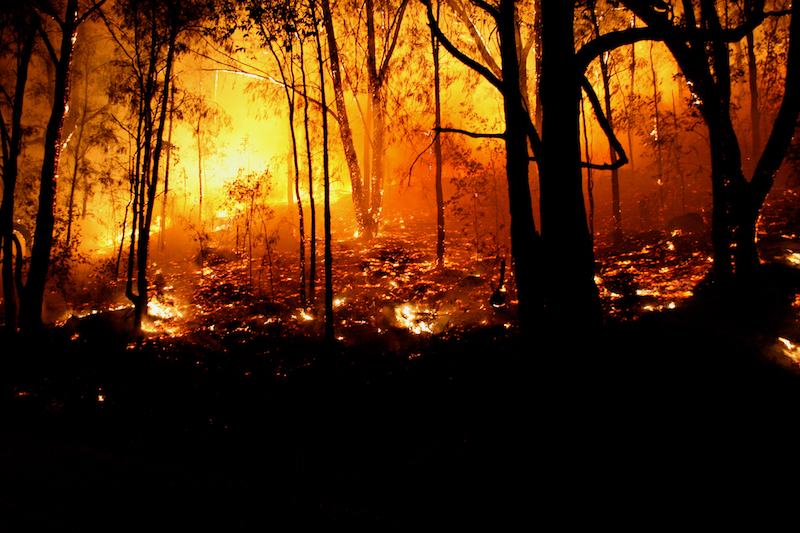Bushfires
Every year thousands of Australian homes and properties are at risk from bushfires.
Wind, temperature, humidity and rainfall affect the behaviour of bushfires. Severe bushfire conditions are influenced by a combination of weather systems, but in most cases, by hot, dry winds.
The dry summer months is usually the most dangerous bushfire time for southern Australia, while northern Australia is most at risk during winter.
It is important to do what you can to protect your family, home, business and assets from bushfire. Insurance helps do this.
Before a bushfire
The best time to prepare for a bushfire is before the bushfire season starts.
People living in bushfire-prone areas should take steps to minimise their risk and prepare a bushfire plan – include evacuation and communication plans and a disaster supply kit.
Local fire services – rural and metropolitan – can provide guidelines on how to best prepare your property for bushfire season.
This includes practical measures such as trimming trees and shrubs, mowing grass and removing cuttings, removing materials that can burn around your home, clearing debris from gutters and ensuring you have hoses and a reliable source of water.
Most household insurance policies include cover for bushfires. Australia has a highly competitive general insurance market, which means you can shop around and find an insurance policy that best suits your individual circumstances.
Before bushfire season you should also:
- Make sure you have enough insurance cover to avoid severe financial loss if your home or contents are destroyed by bushfire
- If you are concerned about the potential total loss of your property, speak to a reputable builder and get a quote for the cost of a complete rebuild. Once you have this, speak to your insurer and make sure your sum insured covers this cost
- Reassess the value of your home and contents, vehicles and any outbuildings you have on your property, and the level of cover you need to financially protect them
- Conduct a household contents inventory to make sure valuable assets are adequately protected and ensure the cover matches the value of these assets
- Make sure you understand what cover you have, as well as any exclusions or limits that may be a part of your insurance policy. It is important to be aware of these exclusions and to query your insurer about any part of a policy you do not understand
There are some insurance terms, exclusions and conditions to be aware of in household insurance policies. These include:
- Embargoes or no coverage for a set time at the start of a policy
- No cover for loss or damage where no flame damage has occurred, such as scorching, melting, heat, smoke, ash or soot
- Coverage for a burning building within a specified distance of your home
- Loss mitigation clauses, such as taking all reasonable precautions:
- For the safety and protection of your building and the site
- To prevent injury or damage to your building or property
- To ensure compliance with all statutory obligations, bylaws or regulations imposed by any public authority relating to the safety of persons or property
During a bushfire
If you live in a bush fire-prone area you should know the fire danger rating each day during bushfire season.
If a fire is approaching you should enact your disaster plan, leaving early if possible and taking your disaster supply kit and pets with you.
There are practical steps you can take to stay safe and minimise damage to your property during a bushfire, including turning off the gas supply, clearing leaves, twigs, bark and other debris from the roof and gutters and moving flammable items – such as woodpiles, paper, boxes, crates, hanging baskets and garden furniture – away from your home.
You should stay informed and listen to local authorities, emergency services and ABC local radio for updates.
It is usually too late to check your insurance cover, or buy a policy, once a bushfire is heading towards your property.
After a bushfire
If you have evacuated, you should not return home until you are advised it is safe to do so.
You should contact your insurance company as soon as possible to seek advice about the claims process, this includes:
- Speak to your insurer before you attempt or authorise any building work, including emergency repairs, and ask for the insurer’s permission in writing. Unauthorised work may not be covered by your policy
- If your home is unsafe, notify your local authorities and check with your insurance company whether you can claim temporary housing expenses
- You can remove and discard any damaged goods that pose a health risk, such as carpets or soft furnishings, but take photos and keep samples of materials and fabrics to show the assessor
- Keep any items that could be repaired and if in doubt speak to your insurer
- Do not be concerned if insurance documents are not readily at hand. Insurers keep records electronically and require only your name and address in order to find a policy
- If you are in urgent financial need you can ask your insurer to fast track your claim and make an advance payment within five business days of you demonstrating your urgent financial need. Any advance payment may be deducted from the total value of your claim
- If your claim has been finalised within one month of the disaster, your insurer must give you six months from the finalisation date to ask for a review of your claim (for instance, if you think the insurer has not accurately assessed your loss), even if you have signed a release.




